Related Research Articles

Roxbury is a neighborhood within the City of Boston, Massachusetts, United States.

Northeastern University is a private research university with its main campus in Boston, Massachusetts. Established in 1898, it was founded by the Boston Young Men's Christian Association as an all-male institute before being incorporated as Northeastern College in 1916, gaining university status in 1922. With more than 38,000 students, Northeastern is the largest university in Massachusetts by enrollment.

Emerson College is a private college with its main campus in Boston, Massachusetts. It also maintains campuses in Hollywood, Los Angeles, California, and in Well, Limburg, Netherlands. Founded in 1880 by Charles Wesley Emerson as a "school of oratory," the college offers more than three dozen degree and professional training programs specializing in the fields of arts and communication with a foundation in liberal arts studies. The college is one of the founding members of the ProArts Consortium, an association of six neighboring institutions in Boston dedicated to arts education at the collegiate level. Emerson is also notable for the college's namesake public opinion poll, Emerson College Polling.

Black Nativity is an adaptation of the Nativity story by Langston Hughes, performed by an entirely black cast. Hughes was the author of the book, with the lyrics and music being derived from traditional Christmas carols, sung in gospel style, with a few songs created specifically for the show. The show was first performed Off-Broadway on December 11, 1961, and was one of the first plays written by an African American to be staged there. The show had a successful tour of Europe in 1962, one of its appearances being at the Spoleto Festival of Two Worlds in Italy.

Wayland High School is the public high school for the town of Wayland, Massachusetts, United States. During the 2022-2023 school year, there were 824 students enrolled at the high school. Wayland High School is consistently ranked as one of the best schools in the Boston area. In 2023 Boston Magazine ranked WHS as #4 on their list of "Best Public High Schools in Boston".

The Winsor School is a private college-preparatory day school for girls in the Longwood neighborhood of Boston, Massachusetts. It was established in 1886 and educates girls in grades 5–12.
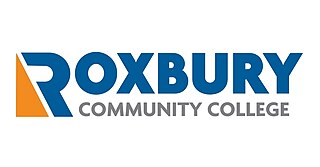
Roxbury Community College (RCC) is a public community college in the Roxbury neighborhood of Boston, Massachusetts. RCC offers associate degrees in arts, and sciences, as well as certificates. RCC has transfer agreements with Curry College, Northeastern University, Emerson College, Lesley University, and other four-year schools. RCC credits transfer to all public colleges and universities in Massachusetts through the MassTransfer Program.
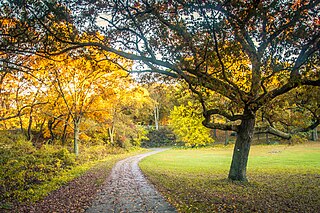
Franklin Park, a partially wooded 527-acre (2.13 km2) parkland bordered by the Jamaica Plain, Roxbury, and Dorchester neighborhoods of Boston, Massachusetts, is maintained by the City of Boston Parks and Recreation Department. It is Boston's biggest park and the site of Franklin Park Zoo. It was designated a Boston Landmark by the Boston Landmarks Commission in August 1980.
Edmund Barry Gaither is known for his education and museum-related activities.

Leon Mobley is a percussionist and drummer. He is founder and artistic and musical director of Da Lion and Djimbe West African Drummers and Dancers, an actor, and a member of Grammy-winning band Innocent Criminals.
The National Center of Afro-American Artists (NCAAA) is a center in Roxbury, Boston, Massachusetts, founded in 1968 by Elma Lewis to "preserv[e] and foster the cultural arts heritage of black peoples worldwide through arts teaching, and the presentation of professional works in all fine arts disciplines." Although the organization's name specifies African-American artists, the organizational mandate includes all African diasporic art. The NCAAA is the largest independent black cultural arts institution in New England, United States. Its alumni have distinguished themselves in the performing arts internationally.
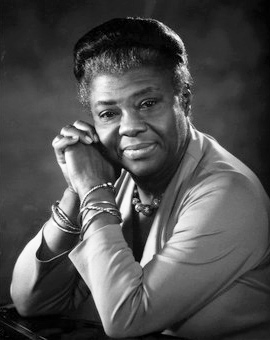
Elma Ina Lewis was an American arts educator and the founder of The Elma Lewis School of Fine Arts and the National Center of Afro-American Artists. In 1981 she was one of the first recipients of the newly organized MacArthur Fellows Grant, in 1981, and in 1983 was awarded a Presidential Medal for the Arts by President Ronald Reagan. She is also an honorary member of Alpha Kappa Alpha sorority.
Freedom House is a nonprofit community-based organization in Roxbury, Massachusetts. Freedom House is located in an area sometimes referred to as Grove Hall that lies along Blue Hill Ave. at the border between the Roxbury and Dorchester neighborhoods of Boston. Although it was historically identified with Roxbury, Freedom House currently refers to itself as being located either in Dorchester or in Grove Hall.

Clarence Howard Blackall was an American architect who is estimated to have designed 300 theatres.
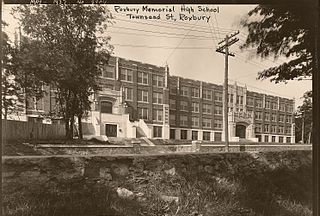
Roxbury Memorial High School is a defunct four-year public high school serving students in ninth through twelfth grades. Originally founded as Roxbury High School, the school was situated at 205 Townsend Street, in the Roxbury neighborhood of Boston, Massachusetts, United States from 1926 until its closure in 1960.
La Alianza Hispana is a social service agency founded in 1969 by residents of Roxbury/ North Dorchester to support Boston's Hispanic population. La Alianza advocates for equal access to services and public resources for the Hispanic Community by combating the effects of discrimination, poverty and challenges of migration.
The Boston Women's Heritage Trail is a series of walking tours in Boston, Massachusetts, leading past sites important to Boston women's history. The tours wind through several neighborhoods, including the Back Bay and Beacon Hill, commemorating women such as Abigail Adams, Amelia Earhart, and Phillis Wheatley. The guidebook includes seven walks and introduces more than 200 Boston women.
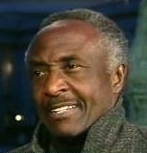
John Wilson (1922–2015) was an American lithographer, sculptor, painter, muralist, and art teacher whose art was driven by the political climate of his time. Wilson was best known for his works portraying themes of social justice and equality.

Fern Cunningham was an American sculptor. One of her best known works is the Harriet Tubman Memorial, which was the first statue honoring a woman on city-owned land in Boston.
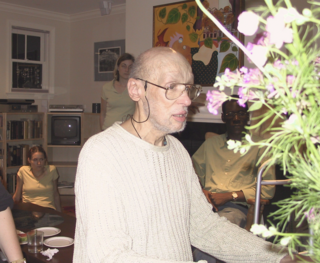
John Andrew Ross was an African American jazz musician, composer, musical director, and choral conductor. Ross was born and raised in Roxbury, Massachusetts and remained in the Boston, Massachusetts area for his whole life. While growing up in Roxbury, Ross's home was frequently visited by his father's college roommate, Langston Hughes. The relationship shared between Hughes and Ross would later manifest as Ross becoming the musical director of Langston Hughes's gospel play "Black Nativity". Acquaintances of Ross, recall him as a welcoming man with a glowing presence and a knack for fine foods.
References
- ↑ 'Lewis, Elma. (1950). Elma Lewis School of Fine Arts Records. Northeastern University Archives and Special Collections, (Box 1, Folder 15), Northeastern University Libraries, Boston, MA. Accessed 16 October 2014.
- ↑ "About the ELSFA". National Center for African-American Artists. 2014. Archived from the original on November 19, 2014. Retrieved November 25, 2014.
- ↑ Kahn, Joseph P. (January 2, 2004). "Arts leader Elma Lewis dead at 82" . Boston Globe. Boston, MA. Retrieved October 16, 2014.
- ↑ "About Ms. Lewis, Emerson College". emerson.edu. Retrieved 2024-06-23.
- 1 2 "Obituaries: Elma Lewis". Boston Globe. Boston, MA. January 3, 2004. ProQuest 404899198.
- 1 2 3 4 5 6 7 8 9 Lewis, Elma. (1992). The Elma Lewis School: A History. Elma Lewis School of Fine Arts Records. Northeastern University Archives and Special Collections, (Box 1, Folder 30), Northeastern University Libraries, Boston, MA.
- ↑ Dunning, Jennifer (January 26, 2004). "Elma Lewis, 82, Arts Educator And Mentor". New York Times. New York, NY. Retrieved 16 October 2014.
- 1 2 3 Maing, Michelle. (1999). "Finding Aid". Elma Lewis School of Fine Arts Records. Northeastern University Archives and Special Collections. Northeastern University Libraries, Boston MA. Accessed 19 September 2014
- ↑ "Articles of Organization 1966, 1988." Elma Lewis School of Fine Arts Records. Northeastern University Archives and Special Collections, (Box 1, Folder 6), Northeastern University Libraries, Boston, MA.
- ↑ "About NCAAA". National Center for African-American Artists. 2010. Archived from the original on November 22, 2014. Retrieved November 19, 2014.
- 1 2 "Playhouse in the Park History". Franklin Park Coalition. 2013. Retrieved November 19, 2014.
- ↑ Kilburn, Will (2006). "New Acts, Deep Roots Mingle" . Retrieved 19 November 2014.
- 1 2 '"Four Year Work Plan (1981-1984)." The Elma Lewis School of Fine Arts Records. Northeastern University Archives and Special Collections,(Box 1, Folder 20), Northeastern University Libraries, Boston, MA. Accessed 16 October 2014.